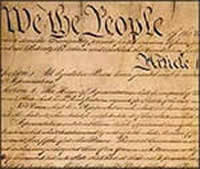
Democracy without the Constitution
by Larry Davis - May 3, 2011

Democracy vs Republic |
Why do we overlook the words, Constitution and Republic in discussions about the current spread of "Democracy"? The most accepted explanation of a Democracy is "the resolutions to society's disputes are made directly by the people or through indirect representation involving free elections". This affords little regard for the opinions of the minority. With little difficulty Democracy may be simply rendered to the phrase "majority rule". This structure requires little more than a single and powerful central command where representatives of the majority meet and make all decisions. When the representatives rule against the requirements of the majority, they are simply replaced in the next election. Without restraints, the majority will naturally fashion tyrannical rulings which elevate their own position and repress the desires of the minority.
Visiting the website of the Office of Management and Budget I discovered a fascinating statement from President Obama, "Rather than fight the same tired battles that have dominated Washington for decades, it's time to try something new. Let's invest in our people without leaving them a mountain of debt. Let's meet our responsibility to the citizens who sent us here. Let's try common sense." As I studied these words, I began to remember some of the activities the Federal Government has attempted to employ since the turn of the 20th century and I will endeavor to apply a bit of common sense.
To accomplish this daunting task I will revisit the master of Common Sense, Thomas Paine, as he notes, "Society in every state is a blessing, but government even in its best state is but a necessary evil." To better appreciate Paine's analysis, we must comprehend his perceptions of society and government. I believe him to understand society is mankind's ability and necessity to join together in harmony to accomplish common interests which are unachievable alone. But since it is beyond the reach of mankind to live in absolute harmony, regulations are mandatory to resolve differences and provide security. The later being the responsibility of government.
Paine also noted, "the more simple any thing is, the less liable it is to be disordered, and the easier repaired when disordered". Can anyone with more recent knowledge of human behavior argue against these long accepted principles of common sense? I think not!
Some will quarrel the Constitution of the United States is too simple and outdated; it is written to limit the powers of the Federal Government and does not define the responsibilities government should assume. Our society has increased in numbers and its needs have grown alongside the magnitude of government. Conventional wisdom appears to presume the powers of government must also increase to satisfy the growing needs of society. I will dispute this philosophy with another of Paine's sentiments, "a long habit of not thinking a thing wrong, gives it a superficial appearance of being right."
The ideologies of our Constitution are intended to protect societies from an escalating central government. Our founders recognized the inevitability of population growth and an increase in the numbers of societies but these factors do not necessitate a more powerful central government. The inherent role of central government to protect the security and freedoms of society should not alter with the changing needs of society.
The earth's ethnicity has altered in the past century as travel and communication have enlightened each of us to the other's customs and traditions. I have no bias toward these changes and do in actual fact embrace them. But one need only review migration patterns of mankind throughout history and look at the world population's trends and behaviors. As the old proverb asserts, "Birds of a feather flock together." The Constitutional Republic envisioned by our founders takes into consideration the need for different ethnic groups and religions to coexist under a central government. The States are allowed to differ one from the other and any impartial examination will disclose they do have countless differences.
The Constitution grants the Federal Government limited authority and responsibility with most powers being reserved to the States or to the people. This intentional distribution of power to the States permits the citizenry to more closely monitor the activities of government and the restrictions it might impose on them. The States in turn delegated many responsibilities to local county or city governments; allowing local societies additional control over their activities.
Reflecting upon the President's remarks, "Rather than fight the same tired battles that have dominated Washington for decades, it's time to try something new", I assert that the same tired battles that have dominated Washington for decades are in fact something new. They have been attempting to force this square peg into a round hole for way too long. Washington has been confiscating the power granted to States, suppressing our personal liberties and driving up mountains of debt that our children and grandchildren will inherit. We have been led to believe that one large central Government can recognize the needs of all the dissimilar societies within our borders and that THEY can solve the issues WE encounter. A sober examination of this premise should reveal the fallacy of such reasoning to even the most casual observer. "We the People" must reject the assertion that concentrating power in a large centralized government can resolve our differences. Voters must insist upon returning authority to State Governments and put an end to abdicating responsibility to Washington.
Tea Party Articles Directory | Tea Party Issues Directory | Tea Party News Directory